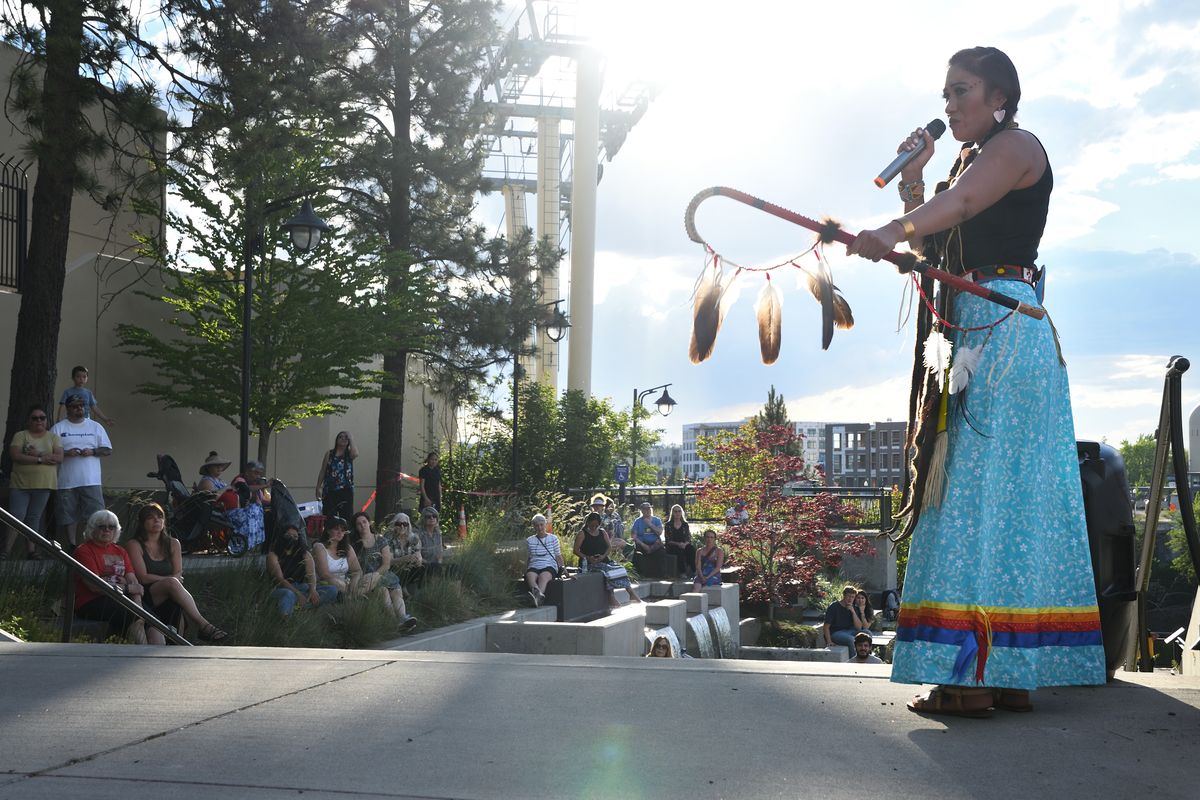‘I call it genocide’: Tribal members gather to pray, share in Spokane after Kamloops mass grave discovery

Leon Eagle Tail felt a wave of emotions two weeks ago when news broke about the discovery of unmarked graves at the Kamloops Indian Residential School in British Columbia.
As sad as Eagle Tail was to hear about the 215 children discovered by ground-penetrating radar, he wasn’t surprised.
“The deaths that they document – it’s just the tip of the iceberg,” Eagle Tail said. “It’s all our tribes that have experienced that. I call it genocide.”
When the A’aninin tribal elder was a kid on the Fort Belknap Indian Reservation in Montana, he saw sobbing 4- and 5-year-olds torn away from their distraught mothers and bused off to boarding schools like the one in Kamloops.
Eagle Tail decided to call a vigil Sunday at The Gathering Place near Spokane Falls so people could sing, share memories, heal and pray after the centuries of trauma boarding schools like the one in Kamloops caused. Dozens of people attended the vigil.
Some played music, sang songs or recited prayers in their native languages. The beat of drums occasionally rattled the chests of visitors.
“We need to pray and let those little children’s spirits go home,” Eagle Tail said.
The Tk’emlúps te Secwe̓pemc First Nation’s discovery last month, and research suggesting additional unmarked graves at a former school in Manitoba, indicate more such gravesites likely exist.
Hundreds of thousands of Native American children in the U.S. and Canada attended boarding schools from the 1800s up until the 1970s. The schools attempted to strip the children of their tribal culture and assimilate them into white European society.
Students were converted to Christianity and routinely beaten if they spoke their native languages or clung to their tribal customs. Thousands of children died at the schools, and sexual assault was common.
Shawnee Bearcub came to the vigil because she has family members who attended boarding schools.
“I’m the granddaughter of the people that the boarding schools were designed to eliminate,” Bearcub said. “I wanted to honor my ancestors who went through that.”
Twa-le Abrahamson-Swan, a member of the Spokane Tribe of Indians, said many Native Americans in Eastern Washington and North Idaho have personal family connections to the Kamloops school, which is a six-and-a-half-hour drive north of Spokane.
“It’s not ancient history,” Abrahamson-Swan said. “These people are still alive. If they’re survivors, their descendants are still here and the impacts are still here or ongoing.”
What happened at the Kamloops Indian Residential School wasn’t unique, Abrahamson-Swan said. For instance, many members of the Coeur d’Alene Tribe of Indians were forced as children to attend the Mary Immaculate School for Native Americans in Desmet, Idaho. Many children of the Spokane Tribe of Indians had to attend the Fort Spokane Boarding School.
Abrahamson-Swan said it’s important to remember that the trauma experienced by Native Americans at boarding schools is still felt by their descendants. Emotional scars and trauma get passed down, she said, and the cultural devastation has been enormous.
“All of these policies they said were in the name of education, but really had lasting impacts and ripped people away from who they were,” Abrahamson-Swan said.
Shawn Brigman, a member of the Spokane Tribe of Indians, said the boarding schools have done tremendous damage to Indigenous peoples.
“They tried to kill our language,” Brigman said. “They tried to kill our architecture, our spirituality, our food processes. Really any model you can think of they tried to kill it in the boarding school.”
Brigman’s great-grandfather Joseph Leonard grew up on the Kamloops Indian Band Reserve and attended the Kamloops Indian Residential School. Brigman thinks his grandfather went to the school too, but he isn’t sure.
Leonard’s experience at the school was so traumatic that the family doesn’t talk about it much, Brigman said. He noted that he’s tried to talk about the unmarked graves discovery with his uncle, but his uncle isn’t emotionally ready to discuss it.
“The thing that sucks for me is I know deep down he’s hurting behind the scenes,” Brigman said.
As horrific as the boarding schools were, they weren’t able to destroy tribal cultures, Bearcub said.
“Through all the traumas, we were able to retain our tribal identity,” Bearcub said. “That in itself is an act of resistance.”